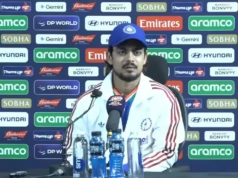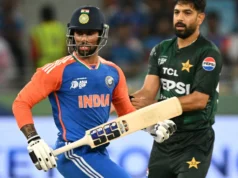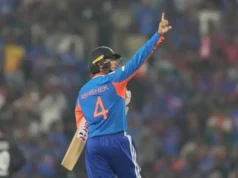In the quarterfinal match between the host country and the world champions, Spain Spained, shattering the determination of a squad that had played with inspiration. Lia Wälti, Switzerland’s talismanic captain, had warned that “Spain is Spain.”
The crowd may or may not have believed, but it made little difference; the hosts had more than just held on, fought, and screamed on. Athenea del Castillo and Clàudia Pina each scored in a five-minute second-half burst to crush mild rumors of a potential upset, but it took until the 66th minute for the tournament favorites to find a way through.
According to their manager, Montse Tomé, “the team made history, these players made history, and we managed to secure a spot in the semi-finals.”
Mariona Caldentey’s missed penalty and Livia Peng’s save from Alèxia Putellas’s spot-kick sandwiched the scores, creating a sense that something extraordinary might be in the making. It had been a game of hope.
Although there was nothing special, a lot more has happened in the past two weeks. There is the acceptance of a team and a competition, followed by the acceptance of women’s football in its entirety, which represents a communal awakening to the historical unfairness of inadequate funding and lack of support. They have both happened in Switzerland. This nation has welcomed the struggling “Nati,” who have led them on an emotional trip, into its hearts and eyes.A massive fan walk of 25,000 people was spurred by the team’s thrilling equalizer against Finland, which set up a quarterfinal matchup with the world champions. The jubilant celebration could be heard reverberating from homes and bars across the nation.
However, this nation also has higher expectations and wants to support these women whose images appear in a growing number of advertisements and on the backs of shirts every day. One tiny poster in the red block behind the Swiss goal said, “Here to stay.” Another said, “This is just the beginning.”
Their manager, Pia Sundhage, stated, “We lost the game, but we’ve won a positive attitude for women’s football.” “I’m really proud of Switzerland; the spectators at the games have been amazing, incredibly emotional, and they stayed instead of leaving.”
This is the kind of response and degree of support that Spain longs for; while their World Cup victory was celebrated at home in the immediate aftermath, it did not lead to a significant shift in the nation’s cultural norms or attitudes about women’s football. Above the small group of Spanish supporters, there was a banner that read, “Estamos con Jenni H” (We are with Jenni Hermoso), next to another that read, “Abuchea el sexismo! #seacabo” (Down with sexism #itsover”), which was a reference to the kiss that forward Hermoso was forced to give during the World Cup trophy presentation by Luis Rubiales, the president of the Spanish football federation at the time.
For the hosts, the task in Berne was possibly the most significant. In 2023, Spain defeated the Swiss in three decisive games, scoring 17 goals and giving up two goals in the World Cup and two Nations League matches. With Wälti, a defensive midfielder for Arsenal, positioned between the center-backs for added protection, Pia Sundhage’s team formed a back five.
Switzerland should have taken the lead in the eighth minute after Nadine Riesen’s late challenge on Mariona Caldentey gave away a penalty, but the Arsenal forward missed her spot-kick. Few had given Switzerland any hope of competing with Tomé’s passing dynamos. With the ball thumping the hoarding and the thunder roll from the crowd drowning out the cow bells and drums, it was the lucky break the Swiss needed.
As the Swiss hounded, pressured, and frustrated their opponents, Wälti was outstanding, constantly switching between the midfield and defense. It was an incredible accomplishment that they made it to halftime without scoring any goals. The closest the favorites would come was when Irene Paredes headed off the outside of the post just before halftime.
Although the crowd’s role as the 12th man is cliché, it was difficult to avoid feeling that it was escalating the players in white and the Spanish players’ displeasure in the cauldron of red, where every clearance, tackle, turnover, foul, and even pass was met with a thunderous cry. However, Spain was patient and made two breaches in five minutes by prodding at the white wall.Aitana Bonmatí remarked, “I was composed and self-assured; sometimes you have to fight.” To set up Del Castillo, the two-time Ballon d’Or winner had to perform a moment of magic. The second was as stunning. Pina blasted into the top corner from 20 yards out after clipping the ball from Wälti’s feet. Wälti was certain she had been fouled and paused to complain.
Late in the game, there was some drama when Noelle Maritz was sent off in injury time and Peng saved from Putellas after Beney gave up a penalty for a challenge on Del Castillo, but it didn’t really matter.
Spain advances to the semi-finals, where they will take on the victor of Saturday’s quarterfinal matchup between France and Germany.
We achieved our objective, and now we must continue to get better,” Tomé remarked. However, Switzerland is moving forward toward an exciting future. According to Sundhage, “football and women’s football are important for society.” “Women’s football has somewhat transformed Switzerland.”







